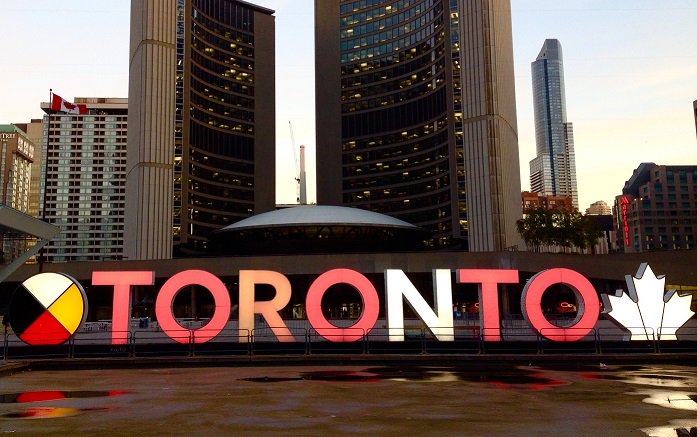Canada News
Toronto residents set to vote Monday on the next four years of civic leaders

If there’s no shortage of big issues to tackle, nor is there a lack of candidates willing to offer their ideas as to how best to fix them. (File Photo: @TorontoComms/Twitter)
Toronto’s municipal election campaign, marked by unprecedented provincial interference, ends Monday when voters get to pass judgment on the incumbent mayor’s record of the past four years and decide who leads a city that accounts for upwards of 10 per cent of Canada economic output for the next four years.
Consistently ranked among the world’s most livable places, the city of about 2.8 million people is nevertheless grappling with such seemingly intractable issues as housing affordability, homelessness, gridlock and overcrowded transit, and an uptick in gun violence.
If there’s no shortage of big issues to tackle, nor is there a lack of candidates willing to offer their ideas as to how best to fix them. In all, 34 competitors are vying to thwart Mayor John Tory as he seeks a second term, although polls suggest his only real, if long-shot challenger, is Jennifer Keesmaat, once the city’s chief planner.
Kim Wright, a municipal affairs expert and vice-president with Hill+Knowlton Strategies Canada, says not much separates the two policy-wise despite some of their campaign rhetoric.
“There hasn’t been one particular issue that has caught fire,” Wright said. “That’s because the policy differential between Jen Keesmaat and John Tory is really not that far apart.”
Another 242 candidates are duking it out for a sharply reduced 25-member council – down from the 47 seats they would have contested had not rookie Premier Doug Ford abruptly blown up that notion mid-way through the campaign.
In 2014, when Tory beat off a challenge from Ford, slightly more than 54 per cent of the roughly 1.6 million eligible voters cast ballots. That was up from the barely half who voted in 2010 in the election that thrust Ford’s younger brother Rob into the mayor’s office and the city into the international public eye due to his drug use and other antics before cancer derailed his re-election bid.
Tory, 64, who came to office promising to restore a measure of sanity and dignity to the office after the tumult of the Rob Ford tenure, casts himself as a steady, pragmatic politician who builds consensus and gets things done.
“Bland works,” Wright said. “That is certainly something that Mayor Tory takes on.”
As achievements, Tory cites billions of dollars upper governments have committed to improve transit in a city where gridlock-induced road rage has become all too common.
The former corporate executive and married father of four also brags that 3,700 new affordable housing units have been built under his watch. He is pledging to build 40,000 more over the next 12 years. But in a city where the average price of a single-family detached home has powered far north of $1 million and a one-bedroom rents for close to $2,000 a month, Tory has failed on the file, Keesmaat says.
“Too many young people are leaving Toronto and young families are holding off on having kids because they can’t afford a place to call home,” Keesmaat said during the campaign. “The problem has only gotten worse in the last four years and Mr. Tory has either ignored, or refused to use, the tools available to build high-quality rental housing.”
Keesmaat, 48, a married mother of two, casts herself as the bold, dynamic and innovative leader running against a weak incumbent. She is promising a 100,000 new affordable housing units over the next 10 years by freeing up city land for development – an ambitious plan Tory and others criticize as unrealistic.
Both candidates do agree on holding the line on property taxes. Tory says he’s shown he can steer the city in a fiscally responsible manner. Keesmaat, too, says keeping taxes down is an important part of affordability. But she has also said she would slap a surtax on houses worth at least $4 million.
Tory, who styles himself as a national leader in a push for a ban on handguns, is promising to hire 400 new police officers as a way to curb the gun violence that has taken more than 30 lives this year. Keesmaat also supports a handgun ban, but wants to see more community policing and, as Tory has done, is promising more supports for disadvantaged youth.
What remains key and will be unknown until Tuesday, Wright says, is who will end up on council and where the balance of power will reside. That, she says, will likely come down to a few hotly contested ward races.





















